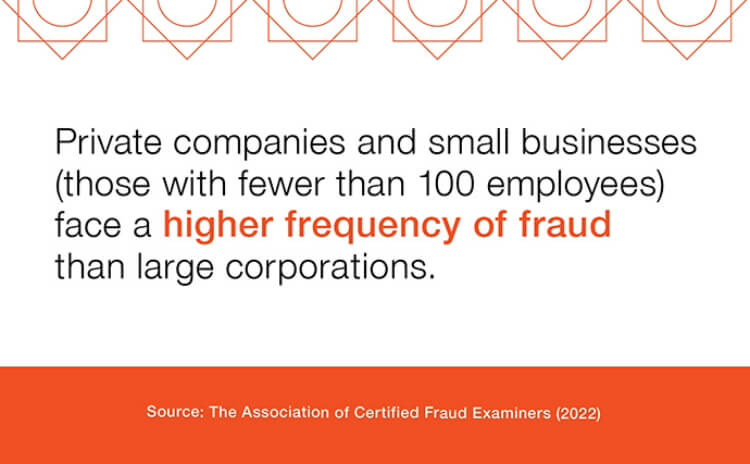The types of corporate fraud you should know about
If you’re a business owner, you’re probably focused on delivering for your customers, hiring the best employees, or strategizing ways to break into a new market. These are some of the exciting reasons you got into business in the first place, right? Then, on the other hand, there is the less fun and glamorous side of running a business, including staying up to date on fraud prevention best practices.
Business fraud can have devastating consequences, making it something you cannot afford to ignore. In fact, some evidence suggests that small businesses are at the greatest risk of fraud. The Association of Certified Fraud Examiners found in a 2022 report that private companies and small businesses (those with fewer than 100 employees) face a higher frequency of fraud than large corporations, and that small businesses had a median fraud loss of $150,000 that year.
In addition to external threats to your business, there’s also the risk of an internal scheme that compromises the integrity of your business.
With this in mind, what are some common types of fraud you need to be aware of as a business owner?

Accounting fraud
Your business has an incentive to always present itself in the best light possible, whether it’s to investors, board members, regulators, customers, or the general public. This creates the possibility of accounting fraud, an internal and illegal scheme in which an employee or a contractor (usually an accountant) manipulates or falsifies financial statements on behalf of your business in order to project a sense of strength. This could also come in the form of hiding transaction or other financial information related to your business.
Payroll fraud
This form of fraud occurs when an employee manipulates your company’s payroll to illegally pay themselves money they’re not entitled to. This happens when an employee gains access to the payroll system and alters their wages, or finds a way to clock more hours than they worked. Employers can also commit payroll fraud by illegally withholding wages from employees. To avoid and detect payroll fraud, be sure to monitor for errors or changes in payroll records.
Invoice fraud
Have you ever received an invoice for a product or service you didn’t authorize? It’s possible you forgot about something you ordered, or that an employee of yours initiated an order without your awareness. But there’s also the chance that this is invoice fraud, in which a scammer tries to trick you into paying for something you didn’t order. The same type of fraud can be committed via wire transfers. With all the bills and invoices you handle as a business, it’s important to keep clear records of what you ordered so that you can detect if an invoice is legit or not.
Money laundering
By now, you’re probably familiar with money laundering from a TV show or movie, as this type of fraud can make for a sensational, albeit illegal, story. As the name suggests, money laundering is a tactic used by businesses or individuals to “clean” money that is earned from illegal activities so that it appears legitimate to authorities and the public. Money laundering, depending on the circumstances, comes with serious legal consequences and can spell the end to any business engaging in this type of illegal scheme.
Vendor fraud
If your business deals with vendors and orders of large quantities, you’ll want to be aware of vendor fraud. This type of scheme can present itself in many different ways, but essentially it involves a fake vendor billing your company for an order you didn’t seek or intentionally over-billing for the amount you ordered or received. Sometimes, you might receive duplicate invoices for one order. To spot this type of fraud, always do your due diligence in reviewing all orders and payments. Have an approval process in place to ensure orders and vendors are being vetted for legitimacy.
Business Email Compromise (BEC)
In this day and age, there are several digital business fraud schemes to be aware of, including phishing, spear phishing, and spoofing that fall into the category known as Business Email Compromise (BEC). Fraudulent email schemes can prey on you and all of your employees. All it takes is one click from you, an unaware employee, or trusted vendor to accidentally fall victim to malware, ransomware, or provide sensitive business information to a fraudulent actor. A compromised email account (BEC) could be used to falsify account change authorizations, approve wire transfers, create fake invoices. Best cybersecurity practices are a must for your business, including training employees to spot and report suspicious emails, backing up your business data, and installing the latest security updates to your software.
Check and wire fraud
This common form of fraud occurs when a scammer uses a phone, mail, or the internet to steal money from a business. Not only can the financial loss be devastating, but the funds are gone almost immediately making it hard to prevent or minimize damage. Before initiating a wire transfer or mailing a check, it’s imperative to confirm the identity of the vendor and implement dual approval controls on your team.
Protecting your financial freedom
Westfield Bank understands the latest trends and has what your business needs to reduce your fraud vulnerability. Learn more and help ensure your business and its most valuable assets are safe at www.westfield-bank.com/fraud-prevention-and-protection.



